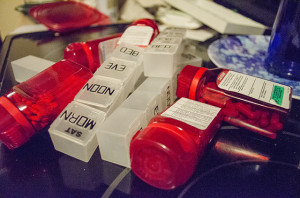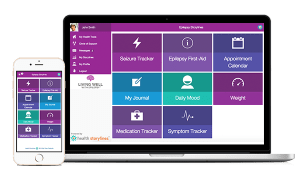 This month I am going to be focusing on home treatment for Epilepsy. Whether it is for yourself, a friend, or a loved one, there are a few things you can add to your life that may make things a little less stressful or tiring. I am not a Doctor, so I won’t give advice on medication; if you have any questions regarding medical treatment please consult your Neurologist or family GP.
This month I am going to be focusing on home treatment for Epilepsy. Whether it is for yourself, a friend, or a loved one, there are a few things you can add to your life that may make things a little less stressful or tiring. I am not a Doctor, so I won’t give advice on medication; if you have any questions regarding medical treatment please consult your Neurologist or family GP.
Taking your medications correctly
Before my final diagnosis, my family and I had no idea of how much work would need to go into my treatment plan. The plan of: when the best time is to take my medications, what other medicines I could no longer take, how we had to make adjustments to our lives and how it would affect my social life. If you are using antiepileptic medicine (AED’s), you must remember to take your medicine/help your child take their medicine exactly as prescribed. Did you know that not following the medication plan could contribute to the failure to control your seizures?
When you or your child is diagnosed, your GP will set up a schedule of medicine dosages, so it is really important that you stick to this. For a year or so after my diagnosis, I kept a chart up on my notice board in my bedroom and on a magnetic board on the fridge to remind me of my dosages and when to take them. I also kept a pillbox so I knew if I’d missed a dosage or not. You can get pill boxes from most pharmacies or local shops–take a look around!
Avoiding the triggers
During your seizure treatment plan, if it is possible, try to identify and avoid things that may make you more likely to have a seizure. I have mentioned in previous columns about keeping a diary; this is a really good idea and will certainly help document your daily activities and when seizures occur most. Some of my main triggers are: not getting enough sleep, being emotionally stressed and not eating enough. To avoid my seizures happening, I ensure that I don’t let myself become overtired or drained. I don’t have any caffeine drinks after a certain time, I do not eat anything sugary that may keep me awake, and I avoid using the computer right before bed.
 Keep notes
Keep notes
It’s a good idea to use your diary to keep a note of any seizures you have, because sometimes the trigger is there but it’s hard to see, so having it written down will help. Use little columns to include the date, time of day, and any details about the seizure that you can remember.
If you prefer to keep notes electronically you can always try the Epilepsy Health Storylines app.
First Aid
First aid is a crucial part of home treatment. If your child or someone else in your family has epilepsy, knowing first aid is key. Make sure everyone in the house knows what to do if a seizure occurs, and if you’re out in public, try and wear a Medical ID bracelet, badge or necklace. I recently wrote a review on a Medical squid, which is a fantastic bracelet. It is made especially for you, so it is unique to everyone. In the event of a seizure or accident that leaves you unconscious or unable to speak for yourself, a medical ID bracelet will let those who are treating you know that you have epilepsy.
Things to avoid
Alcohol can reduce your medication’s effectiveness.
A lot of people like to enjoy a nice drink after a long week at work, a drink over dinner or a night out for somebody’s birthday, but sometimes it’s easy to forget that drinking excessive amounts of alcohol can affect your liver’s metabolism, and this can alter how your body processes anti-epileptic medications.
Alongside this, drinking a lot of alcohol can make you drowsy, and drowsiness can be a potential seizure trigger. It’s nice to have a drink (So I’ve heard, I cannot drink due to my seizures but it looks like fun), but it’s a good idea to be careful.
Home treatment gets easier
Although it’s hard work following a home treatment plan at first, it does get easier over time. Try not to let epilepsy take control of your life.









Patty
On part of your blog I think you said we need to explain what is Epilepsy or Seizures to the child. I have tried to explain that to my grandson who is 7 years old so he may learn to be more sensitive to “feeling different before he passes out” so maybe he could sit down or at least get off the swings or monkey bars at school. But what ever words I’ve used he does not seem to understand. Do you have any suggestions? Should I show him a picture of someone having a seizure on the internet? would that help or make it worse? I appreciate your help. Patty
Jessica Keenan Smith
It may be difficult for your grandson to get off the swings or monkey bars before his seizure begins especially if he does not have an aura to warn him. Your comment makes me wonder if a picture book would help to explain.